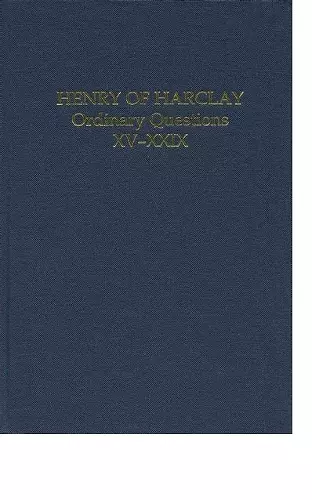Henry of Harclay
Ordinary Questions, XV-XXIX
Format:Hardback
Publisher:Oxford University Press
Published:7th Aug '08
Currently unavailable, and unfortunately no date known when it will be back

This volume completes the first full edition of the later work of the medieval philosopher and theologian Henry of Harclay. In colloboration with Raymond Edwards, an English translation is printed on facing pages, making this work available to a much wider audience. The twenty-nine Quaestiones Ordinariae cover a range of topics in metaphysics, theology, physical science, philosophical anthropology and ethics, which were among the most important of those debated in the early fourteenth century. The articles provide a window to this era, as Harclay discusses many of the main questions of his day: whether and why we choose what is evil, how God can know the future and we can still be free, what a virtue is, whether the human soul survives death, whether all things are made up of atoms. This edition enables us to evaluate Harclay, not only in relation to other notable thinkers of his time (such as John Duns Scotus and William of Ockham) but to appreciate the inner coherence of his own thought. An extensive introduction to Harclay's life, works and doctrine is provided. The volumes will also benefit scholars following the debates among lesser-studied thinkers such as William of Alnwick, Thomas of Sutton, Nicholas Trivet, and Robert Walsingham, whom this edition shows to have been in dialogue with Harclay during the years of the composition of his Quaestiones, 1310-1317. Because of the clarity of Harclay's thought and style, now mirrored in the English translation, the Quaestiones Ordinariae are an ideal way to introduce students to key problems in medieval philosophy, as well as to enable scholars to deepen their knowledge of the debates of this period. Questions 1-14, together with an extensive introduction, were published as volume XVII in the Auctores series.
impeccably edited by Mark Henninger and elegantly translated by Raymond Edwards and the editor, reveal for the first time to a wide readership the preoccupations of a brilliant group of thinkers. Non-specialist readers will find much of interest by dipping into them; they do not need to be read in any particular order. The editor and translator are to be congratulated on an achievement of more moment than they perhaps originally expected. * Jeremy Catto, The English Historical Review *
ISBN: 9780197263815
Dimensions: 241mm x 163mm x 34mm
Weight: 907g
492 pages